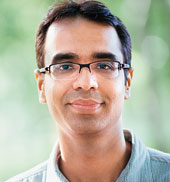
Yoga may be the workout of the moment but Wall Street banker and bestselling writer Karan Bajaj does it for spirituality in daily life. His third book, The Seeker (Penguin Books India, Rs 250), traces the journey of a man, Max, who leaves behind his life in Wall Street and travels to India to seek answers to questions that haunt him. t2 caught up with the New York-based BIT Mesra and IIM Bangalore alumnus over phone when he visited New Delhi recently.
Yoga is in the global limelight following Prime Minister Narendra Modi’s advocacy...
At one level, I wish the attention was on the more spiritual side, what in Sanskrit is termed as chitta vritti nirodha, the stopping of the restless thought waves of the mind, which is the true purpose of yoga. On the other hand, we all enter the practice at our own level of development, so I don’t think the fitness aspect diminishes its capacity for emotional and spiritual transformation.
In my own case, when I entered yoga three years ago, I entered at the grossest level — wanting to be more physically flexible. But within six months, I could see myself becoming increasingly aware of the effect of my diet on my thoughts. I quit caffeine and alcohol because it made me restless, and later I turned vegetarian since I felt lighter with a plant-based diet. As my practice deepened, I now sleep better, am far more productive at work and have a deep sense of centre in everyday activities.
You’ve said The Seeker was inspired by the sabbatical you and your wife (Kerry) took from work for a year in 2013. How much of Max’s journey is autobiographical?
It has been fictionalised a lot. Fiction, as they say, is life without the boring parts. Much of what you read, though, is what we’ve experienced. We came to India from Europe by road and the whole point was to detach ourselves from material comforts.
We stayed in some of the lowest-rung hotels, took buses and trains and walked a lot. It took us almost three months to get to India and we stayed in India for seven months. We trained to be yoga teachers for two months in a remote ashram in south India, 50km from Madurai.
After that we went up to the Himalayas and did the 30-day silent retreat at Vipassana. I wrote the book in Portugal and Goa.

Do you think it’s possible to be spiritual while leading a regular life?
It is possible to be spiritual in everyday life… the real challenge is to spiritualise your daily activities. To go about life without a sense of self and ego is the true test of spirituality. But to get there, you have to take a deep dive. You can’t just read a few books and reach that level of spirituality.
How long have you been a yogi and what made you decide that was your calling?
I’m a striving yogi since I haven’t reached that point of complete dissolution of the sense of self, but I’m trying to let go of worldly attachments. I’ve been very drawn to eastern traditions for almost 15 years now. The catalyst for the journey was when my mom battled cancer in 2010. Her physical decline was upsetting and that’s when the existential questions arose, especially after she passed away in 2011. That’s when the journey became more personal and less theoretical.
Wall Street is about making money, spirituality is about renouncing money. How do you reconcile the two?
I think spirituality is not about renouncing money as much as the attachment to money. The idea is to not be attached to or crave anything, either comfort or discomfort. But to answer your broader question on balancing commerce and spirituality, I think it’s an evolving journey — as my life gets purer, the balance becomes trickier. I left Kraft, my previous employer, when I came back [to the US] because I was uncomfortable with marketing processed food when I was moving to a simpler, yogic diet. Right now, I’m selling organic baby products, so there isn’t too much conflict in balancing the spiritual and the material. But maybe as my own life gets less and less materialistic, working in the consumption industry would become more challenging.
Lastly, is it true your book Keep off the Grass is being made into a Hollywood film by the makers of The Dark Knight?
They optioned the rights but less than 10 per cent of movies optioned in Hollywood get made into films. I think the novel has joined the ranks of the majority!
Are you a fan of Karan Bajaj’s books? Tell t2@abp.in











